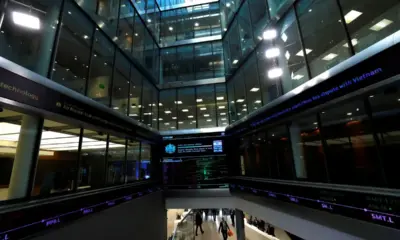Business
London’s Financial District Eyes Global Expansion as Post-Brexit Deals Rise

London’s financial heart, long regarded as Europe’s leading hub for global banking and investment, is entering a new phase of expansion in 2025. After years of post-Brexit adjustment, the City of London is regaining momentum, driven by international trade agreements, fintech innovation, and rising foreign investment. Analysts say the capital’s adaptability, blending tradition with technology, is once again making it a key player in global finance.
Renewed Investment Confidence
According to the UK Office for National Statistics (ONS), foreign direct investment into London’s financial and professional services grew 9.4% year-on-year in early 2025. Much of this growth stems from trade deals signed with India, Japan, and the Gulf Cooperation Council (GCC) nations, which have reopened channels for financial collaboration after years of uncertainty.
The City of London Corporation reports that over 1,200 new fintech and wealth management firms have set up operations since 2023, many attracted by London’s stable legal framework and deep capital markets. The Financial Conduct Authority (FCA) has also expanded its regulatory sandbox, enabling startups to test blockchain-based products and cross-border payment systems before commercial launch.
Large institutions are capitalizing on this renewed dynamism. HSBC recently announced a £1.2 billion reinvestment plan in its London headquarters, while JP Morgan and Goldman Sachs are expanding digital trading operations in Canary Wharf. Venture funding is also rebounding, with fintech investment exceeding $17 billion in 2024, making the UK the largest fintech hub in Europe.
Global Outreach and Fintech Leadership
London’s renewed strength lies in its outward-looking strategy. The UK–Singapore Fintech Bridge and UK–UAE Financial Dialogue have created new routes for digital banking collaboration, opening opportunities for British startups to serve Asian and Middle Eastern markets.
The Bank of England’s Digital Pound pilot is another catalyst, signaling London’s intention to lead in central bank digital currency (CBDC) development. Financial experts note that London’s global credibility in regulation and risk management gives it a comparative edge over newer fintech hubs like Dubai or Hong Kong.
Simultaneously, the rise of sustainable finance is reshaping the City’s identity. The London Stock Exchange (LSE) now lists more than £300 billion in green bonds, and corporate reporting rules now require transparent carbon disclosures. These moves strengthen London’s position as a global center for ESG (Environmental, Social, and Governance) investment.
Challenges and Future Outlook
Despite optimism, challenges persist. High operating costs, competition from EU cities such as Frankfurt and Paris, and the lingering effects of inflation remain barriers for smaller firms. The British Chambers of Commerce (BCC) has called for further tax reforms and visa flexibility to maintain London’s talent pipeline.
However, policy signals remain encouraging. The UK Treasury’s 2025 Growth Plan promises £5 billion in infrastructure upgrades for transport and digital connectivity across the Greater London area. Financial leaders see this as essential to maintaining global competitiveness and investor confidence.
Conclusion
Five years after Brexit, London’s financial district is proving that resilience and innovation can coexist. The city is no longer just Europe’s financial capital it is positioning itself as a global platform for digital finance, sustainable investment, and economic diplomacy. With technology, trade, and talent converging, London’s financial pulse is beating stronger than ever.





















